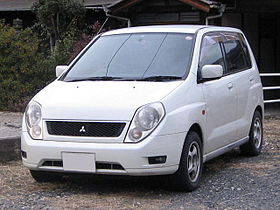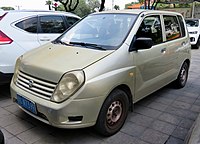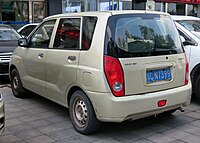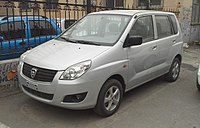| This article needs additional citations for verification. Please help improve this article by adding citations to reliable sources. Unsourced material may be challenged and removed. Find sources: "Mitsubishi Mirage Dingo" – news · newspapers · books · scholar · JSTOR (December 2018) (Learn how and when to remove this message) |
| Mitsubishi Mirage Dingo | |
|---|---|
 Pre-facelift Mitsubishi Mirage Dingo Pre-facelift Mitsubishi Mirage Dingo | |
| Overview | |
| Manufacturer | Mitsubishi Motors |
| Also called | Hafei Saima (China) |
| Production | 1998–2003 2001–2014 (China) |
| Assembly | Japan China: Harbin (Hafei) |
| Body and chassis | |
| Class | Mini MPV |
| Body style | 5-door hatchback |
| Powertrain | |
| Engine | 4G13 1.3 L I4 4G15 1.5 L GDI I4 4G93 1.8 L GDI I4 (2000–03) |
| Transmission | INVECS-II 4-speed automatic (1998–2000) 4-speed automatic (2000–03) INVECS-III CVT (2000–03) |
| Dimensions | |
| Wheelbase | 2,440 mm (96.1 in) |
| Length | 3,885–3,920 mm (153.0–154.3 in) |
| Width | 1,695 mm (66.7 in) |
| Height | 1,620–1,635 mm (63.8–64.4 in) |
| Curb weight | 1,170–1,280 kg (2,579.4–2,821.9 lb) |
| Chronology | |
| Successor | Mitsubishi Colt |
The Mitsubishi Mirage Dingo is a mini MPV built by Mitsubishi Motors from 1998 to 2003, using a shortened version of the Mirage platform.
Overview
The "Dingo" name is derived from Bingo and its connotations of good fortune, but with the B replaced by D to represent Mitsubishi's Diamond logo. The "Dingo" name also sourced from a wild dog native to Australia, dingo (Canis lupus dingo). In Japan, it was sold at a specific retail chain called Car Plaza. Exterior and Interior is highly similar to Mitsubishi Dion which is an MPV sold in Japan.
As with most direct competitors in the market segment, accommodation is limited to two rows and five seats. The rear bench is split 50-50, with each section able to be slid forwards or backwards individually. Alternatively, folding or detaching the rear chairs provides a large and flat storage area. The rear seats can also be flipped downward to form a pair of beds. Because the gearshift is column-mounted there is no transmission tunnel, thus enabling occupants to walk between front and rear seats.
Initially available with the 4G15 "Orion" 1.5 L GDI powerplant mated to an INVECS-II 4-speed automatic, a smaller 1.3 L version (without GDI) and a larger 4G93 1.8 L version were introduced with a facelift in 2000, as well as Mitsubishi's INVECS-III continuously variable transmission.
-
 Pre-facelift Mitsubishi Mirage Dingo
Pre-facelift Mitsubishi Mirage Dingo
-
 Facelift Mitsubishi Mirage Dingo
Facelift Mitsubishi Mirage Dingo
-
Facelift Mitsubishi Mirage Dingo
Hafei Saima
In China, the Dingo is license-built and marketed as the Hafei Saima from April 2001 to 2014.
-
 Hafei Saima (China)
Hafei Saima (China)
-
 2004 Hafei Saima (China)
2004 Hafei Saima (China)
-
 2004 Hafei Saima (China)
2004 Hafei Saima (China)
-
 Hafei Saima facelift (China)
Hafei Saima facelift (China)
-
 Hafei Saima facelift (China)
Hafei Saima facelift (China)
Annual sales
| Year | Domestic sales | Exports |
|---|---|---|
| 1998 | unknown | |
| 1999 | ||
| 2000 | 16,696 | 1 |
| 2001 | 15,143 | - |
| 2002 | 4,076 | - |
| 2003 | 24 | 143 |
| 2004 | - | 127 |
(Sources: Facts & Figures 2000, Facts & Figures 2005, Mitsubishi Motors website)
References
- Facts & Figures 2000, p.17, Mitsubishi Motors website
- World of Cars 2006·2007. Warsaw, Poland: Media Connection Sp. z o.o. 2006. p. 234.
This article about a modern automobile produced after 1975 is a stub. You can help Misplaced Pages by expanding it. |